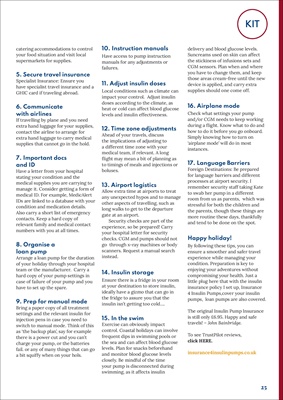
25
KIT
your food situation and visit local
supermarkets for supplies.
5. Secure travel insurance
Specialist Insurance: Ensure you
have specialist travel insurance and a
GHIC card if traveling abroad.
6. Communicate
with airlines
If travelling by plane and you need
extra hand luggage for your supplies,
contact the airline to arrange for
extra hand luggage to carry medical
supplies that cannot go in the hold.
7. Important docs
and ID
Have a letter from your hospital
stating your condition and the
medical supplies you are carrying to
manage it. Consider getting a form of
medical ID. For example, MedicAlert
IDs are linked to a database with your
condition and medication details.
Also carry a short list of emergency
contacts. Keep a hard copy of
relevant family and medical contact
numbers with you at all times.
8. Organise a
loan pump
Arrange a loan pump for the duration
of your holiday through your hospital
team or the manufacturer. Carry a
hard copy of your pump settings in
case of failure of your pump and you
have to set up the spare.
9. Prep for manual mode
Bring a paper copy of all treatment
settings and the relevant insulin for
injection pens in case you need to
switch to manual mode. Think of this
as 'the backup plan', say for example
there is a power cut and you can't
charge your pump, or the batteries
fail. or any of many things that can go
a bit squiffy whe on your hols.
10. Instruction manuals
Have access to pump instruction
manuals for any adjustments or
failures.
11. Adjust insulin doses
Local conditions such as climate can
impact your control. Adjust insulin
doses according to the climate, as
heat or cold can affect blood glucose
levels and insulin effectiveness.
12. Time zone adjustments
Ahead of your travels, discuss
the implications of adjusting to
a different time zone with your
medical team, if relevant. A long
flight may mean a bit of planning as
to timings of meals and injections or
boluses.
13. Airport logistics
Allow extra time at airports to treat
any unexpected hypos and to manage
other aspects of travelling, such as
long walks to get to the departure
gate at an airport.
Security checks are part of the
experience, so be prepared! Carry
your hospital letter for security
checks. CGM and pumps should not
go through x-ray machines or body
scanners. Request a manual search
instead.
14. Insulin storage
Ensure there is a fridge in your room
at your destination to store insulin,
ideally have a gizmo that can go in
the fridge to assure you that the
insulin isn't getting too cold….
15. In the swim
Exercise can obviously impact
control. Coastal holidays can involved
frequent dips in swimming pools or
the sea and can affect blood glucose
levels. Plan for snacks beforehand
and monitor blood glucose levels
closely. Be mindful of the time
your pump is disconnected during
swimming, as it affects insulin
delivery and blood glucose levels.
Suncreams used on skin can affect
the stickiness of infusions sets and
CGM sensors. Plan when and where
you have to change them, and keep
those areas cream-free until the new
device is applied, and carry extra
supplies should one come off.
16. Airplane mode
Check what settings your pump
and/or CGM needs to keep working
during a flight. Know what to do and
how to do it before you go onboard.
Simply knowing how to turn on
'airplane mode' will do in most
instances.
17. Language Barriers
Foreign Destinations: Be prepared
for language barriers and different
processes at airport security. I
remember security staff taking Kate
to swab her pump in a different
room from us as parents, which was
stressful for both the children and
the parents, though these things are
more routine these days, thankfully
and tend to be done on the spot.
Happy holiday!
By following these tips, you can
ensure a smoother and safer travel
experience while managing your
condition. Preparation is key to
enjoying your adventures without
compromising your health. Just a
little plug here that with the insulin
insurance policy I set up, Insurance
4 Insulin Pumps,cover your insulin
pumps, loan pumps are also covered.
The original Insulin Pump Insurance
is still only £6.95. Happy and safe
travels! - John Bainbridge.
To see TrustPilot reviews,
click HERE.
insurance4insulinpumps.co.uk